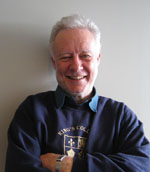WHO epidemiologist discusses fighting AIDS in Africa as part of Ethics Center residency

Dr. Brian Williams
“Fighting AIDS in Africa: Public Health vs. Human Rights”
A talk by Dr. Brian Williams, epidemiologist for the World Health Organization
Thursday, Feb. 12
3:30 – 5 p.m.
International Lounge
Dr. Brian Williams, epidemiologist for the World Health Organization, will deliver the keynote address "Fighting AIDS in Africa: Public Health vs. Human Rights" on Thursday as part of his campus residency this week as the third Distinguished Visiting Practitioner of the International Center for Ethics, Justice and Public Life. The program brings "real-world" leading practitioners to campus for weeklong residencies that combine public lectures, classroom visits, and small-group discussions on topics of current interest to a wide range of students and scholars at Brandeis. Dr. Williams' residency, which runs from Feb. 9 – 13, is hosted by the Ethics Center and the Chemistry Department, with lead faculty member Irving Epstein.
Once exiled from his native South Africa, Dr. Williams has worked in Kenya, Tanzania, and South Africa, in communities troubled by multiple health risks. In his address, he will attempt to reconcile the disparate views of public-health experts and human-rights advocates to explore how policymakers, donors, scientists and service providers can work together more effectively to prevent and treat disease.
Williams has worked in the StopTB Department of the World Health Organization in Geneva for the past five years. His primary interest is in the epidemiology and the control of tuberculosis (TB), especially in Africa and in places where there is a high burden of HIV infection. He has published papers on a range of diseases, including measles, trypanosomiasis, leishmaniasis, silicosis, malaria, tuberculosis and HIV. He contributed to the development of the new Global Plan to Stop TB and has helped to develop policy in the management of HIV-related TB. In 2005, he was part of the team that reviewed the South African national TB control program.
Williams grew up in South Africa and studied at the University of Natal and later at Cambridge University in England, where he published some of his first papers with Brandeis professor Irving Epstein.
Below is a list of remaining events related to Dr. Williams' residency:
"A Day In The Life of an AIDS Epidemiologist"
Thursday, Feb. 12 12 – 1:30 pm ASAC Atrium (across from Heller School)
What’s it like to work as an epidemiologist at the World Health Organization or as a community worker in a mining town? What career path did Dr. Williams follow in his micro- and macro- work on disease? What advice does he have for others considering this work? Bring your lunch; dessert and drinks provided. Cosponsored by the Hiatt Career Center.
"Office Hours with Dr. Williams"
Thursday, Feb. 12 1:30 – 2:45 pm ASAC Atrium (across from Heller School)
Here’s your chance to ask Dr. Williams focused questions in a personal interview. Don’t miss this opportunity to speak with this noted epidemiologist in a casual, individual setting. First come, first served; no appointment needed.
Keynote Address:
"Fighting AIDS in Africa: Public Health vs. Human Rights"
Thursday, Feb. 12 3:30 – 5 pm International Lounge
"Global Infectious Disease Challenges and the Role of Data in Social Justice"
Thursday, Feb. 12 6:40 – 8 pm Heller School, room G4
The burden of ill health is unequally distributed worldwide, with vast disparities in the availability of clean water, food, and adequate healthcare. Dr. Williams demonstrates how quantitative data inform policy decisions, program planning, implementation, and evaluation in order to achieve positive health outcomes. An open session of Professor Sarita Bhalotra’s HSSP 110 – Health and Social Justice.
"Anthropologists and Epidemiologists: An Open Discussion"
Friday, Feb. 13 9:10 – 10:30 am Lown 203
How can anthropologists and epidemiologists incorporate models of cultural diversity in developing effective HIV/AIDS action in sub-Saharan Africa? How might they work together more effectively in partnerships with community-based health workers and traditional healers?





